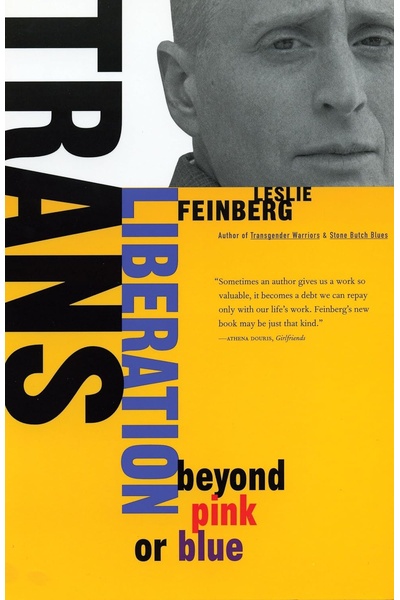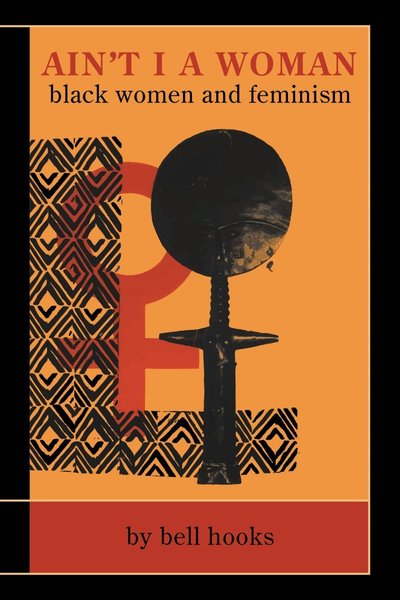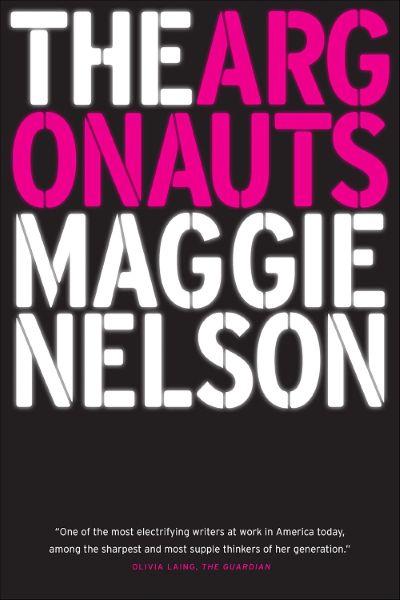Trans Liberation: Beyond Pink or Blue
A foundational text of the transgender rights movement, exploring the oppressive nature of gender binaries and advocating for the liberation of all gender expressions.

📝 Book Review
“Trans Liberation” is Leslie Feinberg’s groundbreaking work, a revolutionary book that laid solid theoretical foundations for the transgender rights movement, directly challenging the oppressive nature of the binary gender system through profound analysis and radical vision. As a transgender activist and theorist, Feinberg not only gave voice to transgender communities through this book but also provided a theoretical framework and practical guidance for liberation for all people oppressed by gender systems. The publication of this book marked an important turning point for the transgender movement from margins to mainstream, establishing crucial foundations for subsequent transgender theory development and political practice.
When analyzing the historical construction of gender, Feinberg deeply traces the rich history of gender diversity across different cultures, providing important perspectives for understanding gender’s socially constructed nature. She extensively studied multiple gender traditions existing in indigenous communities worldwide, traditions that demonstrate the diversity and fluidity of human societies’ understanding of gender, powerfully proving that binary gender systems are not universal patterns in human society.
Feinberg also deeply excavated the experiences and contributions of numerous historical gender boundary-crossers, individuals and groups forgotten or marginalized by mainstream history who were actually constantly challenging and redefining gender boundaries. More importantly, Feinberg profoundly analyzed the historical process of how colonialism imposed binary gender concepts.
She revealed how European colonizers violently destroyed indigenous multiple gender systems and forcibly imposed strict binary gender norms. This analysis not only reveals intrinsic connections between gender oppression and colonial oppression but also provides important perspectives for understanding the historical roots of contemporary gender oppression. Through this historical analysis, Feinberg powerfully argued for the universal existence of gender diversity in human societies, thereby providing historical legitimacy for contemporary transgender rights movements.
Violence of the Binary Gender System
When analyzing the violence of the binary gender system, Feinberg profoundly revealed the systematic harm this system causes to all individuals who don’t conform to strict gender norms. She analyzed in detail how society maintains the binary system through compulsory gender norms that not only restrict individual freedom of gender expression but also ensure compliance through various punishment mechanisms.
Feinberg particularly focused on systematic punishment of gender non-conformers, punishment that includes not only social exclusion and discrimination but also various forms of violence and persecution. Medicalization and pathologization represent another important aspect of Feinberg’s critique. She analyzed in depth how the medical system pathologizes gender diversity, treating transgender identity as a “disease” requiring “treatment.”
This medicalization not only strips transgender people of autonomy but also reinforces the authority of the binary gender system. Simultaneously, she analyzed in detail how legal and institutional discrimination systematically excludes and marginalizes transgender people, with discrimination in employment, housing, healthcare, education, and other areas all reflecting the violence of the binary gender system.
The binary system’s violence operates through multiple mechanisms: forced categorization that denies the reality of people’s experiences, punishment for gender variance that creates climates of fear and conformity, institutional barriers that prevent access to basic services and opportunities, and cultural narratives that position gender diversity as pathological or dangerous.
Transgender Marxist Analysis
Feinberg’s unique theoretical contribution lies in her proposed transgender Marxist analytical framework. Within this framework, she profoundly connects transgender oppression with capitalist systems, revealing intrinsic connections between them. Feinberg analyzed the functional role of gender division of labor in capitalist economic systems, pointing out that binary gender systems provide capitalism with guarantees of cheap labor and social reproduction.
She also deeply studied economic marginalization problems faced by transgender people, including systematic discrimination in labor markets, lack of employment opportunities, and resulting poverty problems. This class analysis reveals that transgender oppression has obvious class characteristics, with transgender people from different class backgrounds facing different degrees and forms of oppression.
Feinberg particularly emphasized how poverty exacerbates gender oppression and how gender oppression deepens economic inequality. This analysis provides important theoretical tools for understanding the complex predicaments faced by transgender people. The Marxist framework also reveals how capitalism depends on gender binaries to maintain divisions among workers, suggesting that transgender liberation and class struggle are interconnected projects.
Her analysis demonstrates how binary gender systems serve capitalist interests by creating unpaid reproductive labor, maintaining wage hierarchies, and preventing solidarity among all oppressed people. This perspective positions transgender liberation as inherently anti-capitalist, requiring fundamental restructuring of economic as well as social relations.
Revolutionary Potential of Transgender Liberation
In discussing the revolutionary potential of transgender liberation, Feinberg demonstrated profound insights into social transformation. She argued that transgender liberation movements possess revolutionary potential to challenge all hierarchical systems because they fundamentally question the foundations of social order viewed as “natural.”
By challenging gender binaries, transgender movements actually question all social hierarchical systems based on “natural” or “biological” justifications. Feinberg emphasized that the true significance of transgender liberation lies in its ability to unite all oppressed people, providing new possibilities for creating a more equal and free society.
This revolutionary potential extends beyond gender issues to encompass critiques of all naturalized systems of oppression. Transgender liberation reveals the constructed nature of seemingly natural categories, opening space for imagining and creating alternative social arrangements based on justice rather than hierarchy.
The movement’s challenge to binary thinking also provides tools for understanding and resisting other forms of categorical oppression, creating possibilities for broader coalitions and more comprehensive approaches to social transformation.
Bodily Autonomy as Core Principle
Bodily autonomy represents a core concept in Feinberg’s theoretical system. In terms of medical justice, she strongly advocated for transgender people’s rights to access affirming medical care, including not only specific medical services but, more importantly, changing medical systems’ attitudes toward transgender identity.
Feinberg vigorously promoted depathologization efforts, advocating for removing transgender identity from disease classifications and promoting informed consent medical models that allow transgender people to autonomously decide what medical services they need. She also emphasized that transgender people need comprehensive healthcare, not just medical services related to gender transition.
The principle of bodily autonomy extends beyond medical care to encompass broader questions of self-determination and freedom from coercive interference. Feinberg’s framework insists that all people have rights to make decisions about their own bodies, gender expression, and identity without external approval or medical gatekeeping.
This approach challenges traditional medical authority while affirming the expertise that transgender people have about their own experiences and needs. The bodily autonomy framework also connects transgender rights to broader reproductive justice and healthcare access movements.
Right to Self-Definition
The right to self-definition represents another important principle emphasized by Feinberg. She firmly advocated for individuals’ rights to refuse others’ definitions of their gender identity, emphasizing the primacy and inviolability of self-identification. Feinberg particularly valued the diversity of transgender experiences, opposing any efforts to standardize or normalize transgender identity.
She advocated for fluid gender identity concepts, acknowledging that gender identity might change over time, and actively promoted recognition and acceptance of non-binary gender possibilities. This emphasis on self-definition challenges all external authorities that claim power to determine or validate gender identity.
The principle extends beyond individual self-identification to encompass collective self-determination for transgender communities, including the right to define community standards, priorities, and strategies rather than having these imposed by non-transgender allies or opponents.
Self-definition also includes the right to reject harmful labels, diagnoses, or categorizations while claiming positive identities and community affiliations that support thriving rather than merely surviving.
Coalition Building and Movement Solidarity
Regarding coalition building, Feinberg deeply explored complex relationships between transgender movements and feminist movements. She emphasized common goals of both movements in opposing patriarchy, arguing that transgender movements and feminist movements both commit to challenging biological essentialist concepts.
Feinberg advocated for expanding definitions of “women” to make them more inclusive while calling on feminist movements to adopt solidarity rather than exclusionary attitudes toward transgender people. She also actively advocated for broad alliances between transgender movements and other social justice movements, including racial justice movements, labor movements, disability rights movements, and immigrant rights movements.
She argued that these movements face similar oppressive structures and therefore need to build coalitions to jointly combat various forms of inequality and discrimination. This coalition approach recognizes that all liberation movements are interconnected and that sustainable change requires solidarity across different communities and issues.
The coalition framework also emphasizes the importance of transgender people of color, working-class transgender people, and other multiply marginalized community members in defining movement priorities and strategies rather than allowing single-issue approaches to dominate.
Daily Resistance and Survival Strategies
At the level of daily resistance, Feinberg shared survival wisdom and strategies of transgender people. She provided practical advice on safely navigating public spaces, emphasized the importance of building support networks, focused on mental health maintenance, and advocated for sharing community resources.
These practical guidelines not only provided concrete survival skills for transgender people but also embodied important values of community mutual aid and collective resistance. Feinberg also actively celebrated transgender culture’s contributions, recognizing important contributions transgender communities have made in artistic expression, linguistic innovation, community tradition building, and resistance aesthetic development.
This cultural creation not only enriches human cultural diversity but also provides important resources for resisting mainstream cultural oppression. Daily resistance strategies include both individual survival tactics and collective organizing approaches that build community power and resilience.
These strategies recognize that transgender liberation requires both immediate survival support and long-term movement building, emphasizing the importance of mutual aid, community defense, and cultural preservation alongside political organizing.
Legal and Policy Critique
At legal and policy levels, Feinberg provided profound critique of strategies relying solely on legal reform. She pointed out the insufficiency of legal recognition, emphasizing needs for deeper structural transformation. Feinberg advocated for transcending limitations of assimilationist politics, proposing more radical demands.
This analysis provided transgender movements with more comprehensive and deeper political vision. Rather than accepting incremental reforms that leave basic systems intact, Feinberg’s approach demands fundamental transformation of the institutions and ideologies that create and maintain gender oppression.
The legal critique also addresses how rights-based frameworks can be limiting, often requiring conformity to dominant norms in exchange for limited recognition rather than challenging those norms themselves. Feinberg’s analysis suggests that legal strategies must be accompanied by broader cultural and economic transformation.
This approach also emphasizes the limitations of relying primarily on state institutions for liberation, given that these same institutions have historically enforced gender conformity and continue to privilege some gender expressions over others.
Vision of Gender Liberation
Feinberg depicted a future vision of gender liberation in the book, including unlimited gender possibilities, abolition of all gender hierarchies, achievement of true gender freedom, and complete liberation of all people. This vision not only provided goals for transgender movements but also offered direction for reconstructing gender relations throughout society.
The liberatory vision extends beyond simple inclusion or tolerance to imagine entirely new ways of organizing society that don’t depend on gender categories for determining access to resources, opportunities, or social recognition. This transformation would benefit not only transgender people but all people constrained by rigid gender expectations.
The vision also encompasses economic transformation that eliminates gendered wage gaps, recognizes the value of all forms of labor regardless of the gender of who performs them, and creates economic security for all people regardless of their gender identity or expression.
This comprehensive approach to liberation recognizes that gender justice cannot be separated from economic justice, racial justice, disability justice, and other forms of social transformation.
Contemporary Relevance and Continuing Impact
“Trans Liberation” remains not only a manifesto for transgender rights but also a powerful critique of all forms of gender oppression, providing detailed theoretical blueprints and practical guidance for building a freer, more equal, and inclusive world. Feinberg’s work reminds us that true liberation must include everyone’s liberation, and true freedom must be built on foundations of respecting and celebrating difference.
This book continues to serve as an important reference for transgender studies and activism, providing ongoing inspiration and guidance for new generations of transgender activists and theorists. The work’s intersectional approach and coalition-building emphasis remain particularly relevant as contemporary movements grapple with questions of solidarity and shared struggle.
Feinberg’s analysis of the connections between gender oppression and other systems of domination provides frameworks for understanding current challenges while her vision of revolutionary transformation continues to inspire those working for fundamental social change.
The book’s influence extends beyond transgender communities to affect broader understandings of gender, embodiment, and resistance, contributing to ongoing projects of liberation and justice for all oppressed people.
Educational and Organizing Applications
Contemporary applications of Feinberg’s work include its use in educational settings to challenge binary thinking, in organizing contexts to build intersectional movements, and in policy advocacy to push for transformative rather than merely reformist approaches to transgender rights.
The book’s emphasis on historical context and cross-cultural analysis provides tools for countering claims that gender diversity is new or unnatural, while its economic analysis offers frameworks for understanding why transgender liberation requires systemic change rather than individual acceptance alone.
Conclusion: Revolutionary Vision for All
Through systematic analysis of gender oppression and revolutionary vision for transformation, Feinberg created a work that continues to inspire and guide those working toward comprehensive liberation. The book’s lasting contribution lies in its demonstration that transgender liberation is inseparable from broader struggles for justice and that all people benefit when rigid gender systems are dismantled.
Feinberg’s revolutionary vision maintains its power to inspire new possibilities for human freedom and dignity, reminding us that another world is possible when we commit to solidarity, resistance, and the celebration of human diversity in all its forms. The work stands as testament to the transformative potential of transgender movements and their contributions to broader struggles for a more just and liberatory world.
Discussion
读书讨论
分享您对这本书的感想和看法,与其他读者交流见解
加入讨论
分享您对这本书的感想和看法,与其他读者交流见解
加载评论中...
Book Info
Related Topics
🛒 Get This Book
 Buy on Amazon
Buy on Amazon Related Books
读书讨论
分享您对这本书的感想和看法,与其他读者交流见解
加入讨论
分享您对这本书的感想和看法,与其他读者交流见解
加载评论中...

